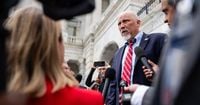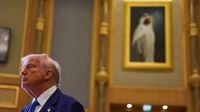President Donald Trump concluded a significant diplomatic tour of the Middle East on May 16, 2025, after securing multiple investment agreements, including a landmark partnership with the United Arab Emirates (UAE) to establish a massive artificial intelligence (AI) data center complex. The project, which aims to enhance AI capabilities and energy efficiency, is set to span 10 square miles and will be powered by a combination of nuclear, solar, and gas energy sources, according to the Commerce Department.
During his visit, Trump also hinted at new global tariff terms and appeared to confirm that Iran has received a nuclear deal proposal. "They have a proposal, but more importantly, they know that they have to move quickly or something bad – something bad’s gonna happen," he stated aboard Air Force One. This comment comes amid ongoing tensions surrounding Iran's nuclear ambitions.
While Trump celebrated his achievements abroad, back in the U.S., he faced a major setback when a group of House conservatives blocked a sweeping budget package intended to advance his legislative agenda. The GOP-led House Budget Committee voted 16-21 against the bill, with five conservative Republicans joining Democrats in opposition. This decision marked a significant embarrassment for House Republican leaders, who are now scrambling to negotiate changes that could win over holdouts.
Among the dissenters was Rep. Chip Roy of Texas, who criticized the bill for not adequately addressing the nation's deficit issues. He expressed that it "falls profoundly short" of necessary reforms. Fellow Republican Ralph Norman of South Carolina also opposed the bill but indicated he might support it with key changes, particularly aimed at tightening eligibility for Medicaid.
Trump's trip to the Middle East included stops in Saudi Arabia and Qatar, where he secured a commitment from Saudi Arabia to invest $600 billion in the U.S. and an agreement from Qatar to purchase Boeing planes. Despite the diplomatic successes, the president's ambitions to broker peace in Gaza and Ukraine remained unfulfilled.
In a related development, Trump indicated that he plans to meet with Russian President Vladimir Putin to discuss the ongoing war in Ukraine. "We have to meet. He and I will meet," Trump said, emphasizing the need for direct negotiations to resolve the conflict. This comes as trilateral talks involving representatives from Ukraine, Russia, and Turkey took place in Istanbul, although Putin did not attend.
On the humanitarian front, Trump expressed a desire for the U.S. to assist in the ongoing crisis in Gaza, stating, "A lot of people are starving" and suggesting that the U.S. must consider both sides of the conflict. The Israeli military has intensified its operations in Gaza, leading to significant casualties, which has drawn international concern.
Amid these challenges, the Department of Homeland Security has requested 20,000 National Guard members to assist with the arrest and deportation of undocumented immigrants, a move that has sparked debate over immigration policies.
Trump's Middle East tour also included a visit to the Abrahamic Family House in Abu Dhabi, an interfaith complex housing a mosque, synagogue, and church. The tour was marked by high-profile meetings with business leaders, where Trump touted his role as a "cheerleader" for American business interests abroad.
As Trump returns to Washington, he is set to sign a presidential proclamation celebrating Asian American and Pacific Islander Heritage Month. This recognition highlights the contributions of over 20 million Americans of AAPI descent and coincides with the historic appointment of Steven Cheung as the first AAPI White House communications director.
Despite the diplomatic achievements, Trump faces scrutiny at home, particularly regarding the blocked budget bill and the implications for his administration's agenda. The rejection of the budget package underscores the divisions within the Republican Party, as leaders now work to balance the demands of conservative hardliners with the needs of more moderate members.
In summary, while Trump's Middle East trip yielded significant business agreements and diplomatic engagement, the political landscape back home presents formidable challenges for his administration. The coming days will reveal whether Republican leaders can navigate these internal divisions and advance the president's legislative priorities.


